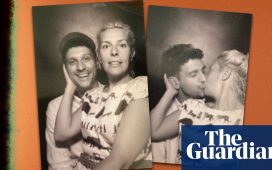I have just discovered how the deep-sea anglerfish mates. My apologies if this is old ichthyological news to you, but it is new news to me, and it is very definitely going to be the hook for this week’s column.
The female deep-sea anglerfish is very large compared with the male deep-sea anglerfish. In some species, he sniffs her out (using his giant nostrils) and upon finding his mate, he bites into her, his teeth and lips then dissolving into her flesh. His little fishy body dangling off hers like a limp appendage, he loses himself utterly, including the use of his eyes – what is the point of them, when he has hers? Some males “become little more than blobs or skin tags”, says James Maclaine, senior curator of fish at the Natural History Museum. The two fuse together so completely as to become one physiological entity, with one combined bloodstream, living one life and, eventually, dying one death.
I mention this because I do not think it only applies to deep-sea anglerfish. There is a particular way of being in a relationship in which two people allow themselves to be – perhaps crave being, as well as fear being – totally fused together, losing their own sense of identity completely, so that they are no longer two separate individuals together but one seamless entity. Not seeing with two sets of eyes, but with one. In fact, I think it is quite common.
This does not happen as dramatically in humans as it does with anglerfish. There is no permanent physical fusing, of course – it is all taking place in a psychological dimension, deep in the unconscious, so it can be more subtle to spot.
But we all know when we lose a friend to a relationship like this; when we watch the vibrant, independent person we cherished disappear, as they seem to forget about their own needs and wants and friendships, conforming to a new sense of identity inside someone else. It can be less easy to spot when it is happening to you.
One sign you might be caught up in a relationship, or indeed a friendship, with tendencies like this is if you find yourself in absolute fury when your “other half” deviates from a particular script you didn’t even realise you had in mind for them. For example, they have a desire to do something different from what you want them to do, or they feel differently about a political issue from how you want them to feel, or their idea of a good holiday is different from your idea of a good holiday, and they do not immediately comply with your wishes. In other words, they are acting as their own, separate person.
One of my friends, who recognised the universality in this description of the deep-sea anglerfish, asked me: “What is the alternative? What is a healthy fish pairing? I bet salmon don’t do this.”
The problem is, I think, that we don’t see this way of relating as an unhealthy pairing; in fact, we idealise it. This is how we romanticise falling in love. My other half. I’m yours. You complete me. Two become one. We don’t want to be salmon; a part of us unconsciously longs for this kind of merging. This makes sense. Every single one of us begins our existence in this state of non-separate fusion, of total enmeshment, within our mother’s body, receiving nourishment from her placenta, taking the oxygen we need from her blood through the umbilical cord – though, unlike the anglerfish, we never share a bloodstream. Our minds are folded up together in a state of apparently perpetual oneness.
A part of us, I think, is always longing to go back to this, a way of being where needs are met before they can even become needs, so we do not have to experience the vulnerability and difference and aloneness necessary to recognise we are receiving something from somebody else. Where there is no hunger, no cold, no hard edges, nothing asked of us and nothing to ask for. The immersive sense of timelessness and boundlessness some seek in heroin, or gambling, or video games, or social media.
Maybe all of us, deep down, want to find someone who loves us unconditionally, as if we are a part of them. But to build better relationships, to build a better life, you have to do it as a separate person. Being a separate person, and tolerating your partner being a separate person, is hard. It is painful. It is a feat of psychological growth. It involves taking responsibility for your own life but also understanding how that life is inevitably shaped by people outside your control. That they too are responsible for their own lives. It involves accepting that there are things that only you can offer yourself – like emotional freedom, personal fulfilment, self-acceptance. And understanding that there are things that only your partner can offer you if they so choose – like their thoughts, their body, their love.
after newsletter promotion
It is hard. It is painful. But it is important. Because otherwise you might wake up one morning and realise that you have lost the use of your own eyes, and that you have been seeing the world through someone else’s. That although – unless you are particularly unlucky – your lips and teeth have not fused irretrievably with your lover’s body, you have nevertheless become a limp appendage to another person’s life.
Moya Sarner is an NHS psychotherapist and the author of When I Grow Up – Conversations With Adults in Search of Adulthood














